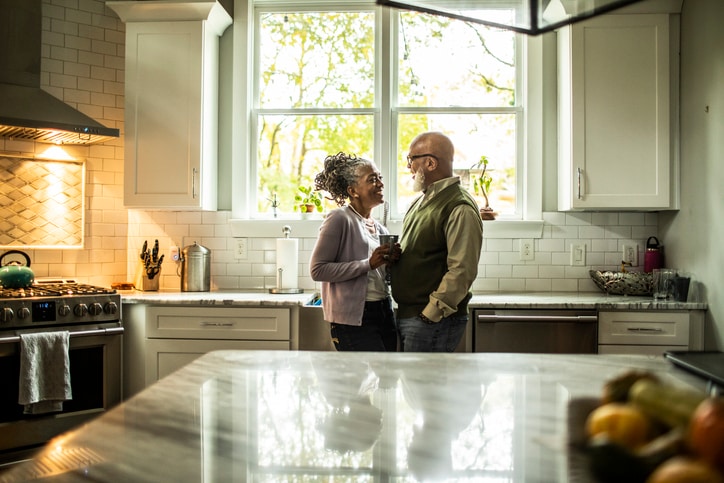Although the Morgan Freeman-Jack Nicholson movie “The Bucket List” was in theaters more than a decade ago, people across America are still enthusiastic about creating “bucket lists” of things they hope to accomplish before they die. The lists are often peppered with extreme sports challenges, exotic travel destinations, and other unique experiences that may take a lifetime to achieve.
When you have a terminal illness, it can be empowering to create a different type of bucket list, one that helps you identify everything you’d like to say to and do with friends and family to tie up the loose ends of your life.
“It is common that the person at end-of-life is less concerned with themselves and more concerned with those they are leaving behind and ensuring that they will be fine without them,” said Veronica Shead, a clinical psychologist in palliative care with the VA St. Louis Health Care System. “Many times, these end-of-life bucket lists are focused on ensuring that they have everything in place to care for their families and friends.”
Instead of jotting down entries like “go skydiving” or “climb Mt. Everest,” you may be more interested in apologizing to a sibling for a long-ago misunderstanding, telling your grown child just how proud you are of his accomplishments, or spending more time with a faraway grandchild so you can develop meaningful memories together.
“Many times, patients will say that a life-limiting diagnosis helps them to clearly focus on what is important in their life and to make most of the time they have left,” said John Mastrojohn, executive vice president of the National Hospice and Palliative Care Organization. “[It can] provide individuals with an opportunity to discover what and who is important.”
Try these ideas to create your own meaningful bucket list.
Need a hand? Find in-home caregivers near you.
Jog Your Memory
If you haven’t given much thought to what you might want to express or share with your loved ones, look to your own past for inspiration. By paging through old diaries, datebooks, or shoeboxes filled with memories, you’ll soon discover which people matter most to you, and you may be prompted by your keepsakes to reminisce together or share life lessons.
“Looking through old photographs can help to encourage memories of significant events, such as weddings, births, and graduations and can provide an opportunity to have meaningful conversations,” Mastrojohn said.
Say What’s in Your Heart
It’s often hard to describe your feelings for and about close friends and family members. You may also struggle with what to say to loved ones with whom you’ve had strained relationships. Research-proven conversation-starters may help.
“Researchers and others have suggested that people say these five things: ‘Please forgive me. I forgive you. Thank you. I Love you. And, goodbye,’” Shead said. “This can be a good guide for many, but this is a very individual process. Many have much more to say, and many times, relationships can be very complicated.”
Picture Your Perfect Day
If you’d like to spend some meaningful time with your loved ones, put some thought into what you’d like to do so that you don’t rely on fallback activities, like watching TV together.
“We asked a man with advanced cancer: ‘What if you learned today that you have one more day to live and you could spend it feeling exactly as you do right now?’” said Elizabeth Goy, staff psychologist with the VA Portland Health Care System, an associate professor of psychiatry at Oregon Health & Science University. “‘What comes up for you as the most important or meaningful way you would want to spend that time?’”
Goy said the man thought about what he wanted to do with his family and how he wanted to express his love for them.
“They made plans to take an adapted fishing trip the next afternoon,” Goy said. “As it happened, he had many ‘one more day’s, and he and his family used this inspiration to define the final days of his life as high-quality, with satisfying activities and discussions.”
If you’re in hospice care and would like to do a particular activity but don’t have the funds to achieve your goal, the National Hospice Foundation’s Lighthouse of Hope Fund may help. Since 2013, it has provided funding of up to $2,500 per person to help those with terminal illnesses have meaningful experiences.
“There have been a number of bucket list experiences provided that have included a last trip to the beach, a day at the rodeo, a vacation in the mountains, a dream dinner, a final flight, and many, many more,” Mastrojohn said. “Realizing the importance of time, each request submitted by the hospice is notified within 48 hours regarding the status of approval.”
Bestow Gifts
Do you have a collection of vintage baseball cards, a cherished heirloom quilt, or diamond earrings that you’d like to pass along to someone specific? It may give you joy to present items like these directly to loved ones, who will be honored by the gesture. In Sweden, the practice of giving away items that you’re no longer using is called döstädning, or “death cleaning,” and it was described in the book “The Gentle Art of Swedish Death Cleaning.”
People will visit if you’re offering them items that are meaningful. Parting with objects this way can be a conversation-starter at a time in your life when people may not know what to say to you.
“My best friend did this,” said Kathleen Cairns, a licensed clinical psychologist in West Hartford, Connecticut. “She gave her special things to her special friends and family. She returned gifts to their givers. It was very cathartic for her.”
Contemplate Next-Best Alternatives
When your health prevents you from being as active as you’d like to be, it’s still possible to say or do the things on your bucket list.
“Consider alternate ways to follow through,” Shead said. “For example, if you are unable to physically visit family or friends, then set up a video chat or phone call. Or if you’re unable to speak, then write to them. The overall goal at end-of-life is for all of one’s actions, as well as healthcare, to be driven by the individual’s values and desires.”





